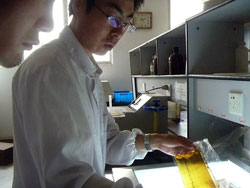 Zachary Larson, Borlaug Summer Intern, is on location at Nanjing Agricultural University and providing us with updates this summer of his trip. Here’s his latest. You can also find a photo album he’s got started here: Borlaug Summer Intern Photo Album. The internship is being sponsored by the Iowa State University Plant Sciences Institute.
Zachary Larson, Borlaug Summer Intern, is on location at Nanjing Agricultural University and providing us with updates this summer of his trip. Here’s his latest. You can also find a photo album he’s got started here: Borlaug Summer Intern Photo Album. The internship is being sponsored by the Iowa State University Plant Sciences Institute.
How to become a researcher in a few easy steps, Part 2
As for my actual activities, most of my time has been spent watching and gaining a better understanding of the main techniques in preparation to use them later on when I will do it myself. For example, I have been constantly observing students preforming their own DNA extractions from wheat leaf or root tip DNA, purifying extracted DNA using centrifuges and protein filters, PCR amplification of select DNA samples, PAGE gel analysis of the PCR results, and finally some cytogenetic techniques like the Gene gun, and florescent staining of wheat chromosomes. While it sounds like a lot, these are just the tools that the students use everyday to perform their work in the lab, and part of the continual research that one must use to produce results.
Beyond the use of lab procedures and machines, the lab also has a lot of basic work that has to be done everyday that is just part of the tediousness that comes a long with being a grad student. As the genetic research here is geared towards developing resistant varieties of wheat, the students much take at least one trip per week to a large farm out side of Nanjing in order to inspect their wheat, and (recently) they have all been involved in harvesting their wheat. Once the wheat has been harvested, all the students during their lab time spend at least three hours a day peeling the wheat seeds outside of the specks波小麦, and then taking these seeds and extracting the embryos from the wheat.
While the second and perhaps more time consuming part of lab life here is one that requires little problem solving, it is the most critical in order to continue any other lab work. Without the constant attention to the wheat fields, and a constant supply of healthy seeds, there would be no opportunity for further plant breeding. So, while this is a significant amount of work to be done beyond one’s own research in a lab like this, with out it, your own research would have no material to work with.
I guess in a bit of a conclusion, the lab here is complex, and the work level required of the students here is significant. Researching of any kind is a frustrating endeavor, and in the case of this lab (or maybe somewhat of Chinese culture) this has fostered a very large camaraderie among the lab mates here. The lab mates here have coped with a lot of the stress by constantly hanging out, becoming best of friends, and many are happily planning to marry soon. So, for me, it has been a surprise that I have been able to see a microcosm of culture that surrounds this one lab.
I have been here just two weeks it has been quite an exciting time, and I am looking forward to exploring more of the lab life around here. This weekend I will be off to taking a trip with one the doctoral students here to visit her hometown village, and starting Monday the entire lab will be involved with harvesting wheat ( with me along of course), and next week I will begin my research project by helping Wang Jia ( a graduate student here) form a genetic map for a wheat chromosome by inspecting different PCR primer results. Being here in China has already taught me a great deal, and I look forward to what personal discoveries lie ahead.
